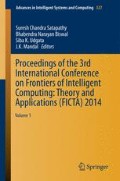Abstract
It has been observed that the growth of communication technologies has led to increased use of computer networks in dissemination of education. An important application area in this perspective where there has been a lot of research is Intelligent Tutoring Systems (ITS). ITS aid the process of learning and evaluation of attainments without human intervention. However ITS are unable to pin point the exact area in a lesson plan where the student is deficient in. In this context, several researchers have used concept maps to perform this identification. However it is time consuming for the educators to construct a concept map of learning manually. Several data mining algorithms have thus been used by the researchers to generate association rules which are used for automated concept map construction. This study proposes automated construction of concept maps using Direct Hashing and Pruning algorithm. The proposed approach was tested with a set of students enrolled in an introductory Java course in some undergraduate colleges in Kolkata and was found to diagnose their learning problems satisfactorily.
Access this chapter
Tax calculation will be finalised at checkout
Purchases are for personal use only
Preview
Unable to display preview. Download preview PDF.
References
Novak, J.D., Canas, A.J.: Theoretical Origins of Concept Map, How to construct them and their use in Education. Reflecting Education 3(1), 29–42 (2007)
Pendidican, F.: Learning Theories, Mathematika dan IInam Alam, Universitas Pendidikan Indonesia
Hwang, G.: A conceptual map model for developing Intelligent Tutoring Systems. Computers and Education 40, 217–235 (2003)
Hwang, G.: A computer assisted approach to diagnosing student learning problems in science courses. Journal of Information Science and Engineering 5, 229–248 (2003)
Park, J.S., Chen, M.S., Philip, S.Y.: An effective Hash based Algorithm for mining Association Rules
Lee, C., Lee, G., Leu, Y.: Application of automatically constructed concept maps of learning to conceptual diagnosis of e-learning. Expert Systems with Applications 36, 1675–1684 (2009)
Pocatilu, P.: Developing mobile learning applications for Android using web services. Informatica Economica 14(3) (2010)
Chen, G., Chan, C., Wang, C.: Ubiquitous learning website: Scaffold learners by mobile devices with information-aware techniques. Computers and Education 50, 77–90 (2008)
Virvou, M., Alepis, E.: Mobile Education features in authoring tools for personalized tutoring. Computers and Education 44, 53–68 (2005)
Kazi, S.: Voca Test: An intelligent Tutoring System for vocabulary learning using M-Learning Approach
Thompson, T.: The learning theories of David P Ausubel: The importance of meaningful and reception learning
Johnson, W.B., Neste, L.O., Duncan, P.C.: An authoring environment for intelligent tutoring systems. In: IEEE International Conference on Systems, Man and Cybernetics, pp. 761–765 (1989)
Vasandani, V., Govindaraj, T., Mitchell, C.M.: An intelligent tutor for diagnostic problem solving in complex dynamic systems. In: IEEE International Conference on Systems, Man and Cybernetics, vol. 2, pp. 772–777 (1998)
Psotka, J., Mutter, S.A.: Intelligent Tutoring Systems: Lessons Learned. Lawrence Erlbaum Associates (1998)
Hagiwara, M.: Self-organizing Concept Maps
Tseng, S.S.: A new approach for constructing the concept map. Computers and Education 38, 123–141 (2005)
Chen, C.C.: Mining learner profile utilizing association rule for web-based learning diagnosis. Expert Systems with applications
Haan, J., Kamber, M.: Data Mining: Concepts and Techniques, 3rd edn. Elsevier (2011)
Hsiao, C.L., Huang, G.J.: An interactive concept relationship construction assisted system for learning diagnosis (2001)
Hwang, G.J.: A Test-Sheet-Generating Algorithm for Multiple Assessment Requirements. IEEE Transactions on Education 46(3) (2003)
Acharya, A., Sinha, D.: A Concept Map Approach to Supporting Diagnostic and Remedial Learning Activities. In: Advanced Computing, Networking and Informatics, vol. 1, pp. 557–565. Springer International Publishing (2014)
Author information
Authors and Affiliations
Corresponding author
Editor information
Editors and Affiliations
Rights and permissions
Copyright information
© 2015 Springer International Publishing Switzerland
About this paper
Cite this paper
Acharya, A., Sinha, D. (2015). Construction of Automated Concept Map of Learning Using Hashing Technique. In: Satapathy, S., Biswal, B., Udgata, S., Mandal, J. (eds) Proceedings of the 3rd International Conference on Frontiers of Intelligent Computing: Theory and Applications (FICTA) 2014. Advances in Intelligent Systems and Computing, vol 327. Springer, Cham. https://doi.org/10.1007/978-3-319-11933-5_64
Download citation
DOI: https://doi.org/10.1007/978-3-319-11933-5_64
Publisher Name: Springer, Cham
Print ISBN: 978-3-319-11932-8
Online ISBN: 978-3-319-11933-5
eBook Packages: EngineeringEngineering (R0)

